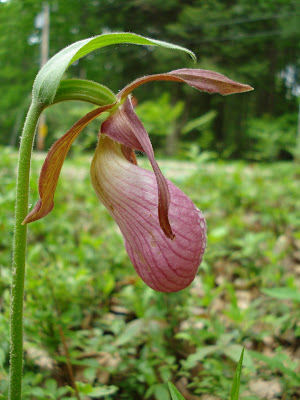

 Over the last couple of days I've discovered several (a total of 6 I think) pink and ONE white lady slipper growing in our family compound (i mean neighborhood, ha) . We've always known they were protected - but that never really stopped me from picking them as a kid. (shame on me, but I was just a kid....picking pretty flowers for my Mom....I didn't really know what protected meant at the time!!)
Over the last couple of days I've discovered several (a total of 6 I think) pink and ONE white lady slipper growing in our family compound (i mean neighborhood, ha) . We've always known they were protected - but that never really stopped me from picking them as a kid. (shame on me, but I was just a kid....picking pretty flowers for my Mom....I didn't really know what protected meant at the time!!) I haven't seen ANY of these beauties in the neighborhood in a long time, and I certainly never thought to take pictures of them either. I love these flowers, LOVE LOVE LOVE them. I think because it means summer is almost here. The bottom picture is a plant called a bunchberry, I think. After it blooms it gets some funky berries. Don't eat 'em if you see 'em.
If you see any of these lovelies in your neighborhood - remember they are a disappearing natural wonder - so don't pick them.


Those are sooo beautiful! How wonderful they are growing in your neighborhood- lucky you!
ReplyDeleteWOW Cat, how great that they are right outside your door. The photos are gorgeous.
ReplyDeleteOHHHH>.. those photos are STUNNING!!!
ReplyDeleteThe white flowers here are not lady's slippers. This is a creeping dogwood: cornus canadensis. I don't know if it's protected or not, but it's a beauty and pretty rare. Lucky you to have them right there to make your spring what it should be.
ReplyDelete